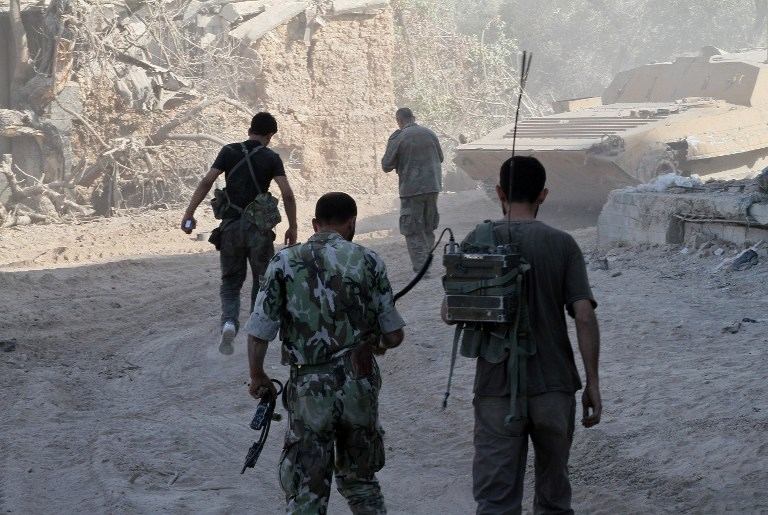SUMMARY
This is AI generated summarization, which may have errors. For context, always refer to the full article.

DAMASCUS, Syria (UPDATED) – Syria, under a barrage of international pressure, gave the green light Sunday, August 25, to a UN probe into an alleged chemical weapons attack as ally Iran warned against US military intervention.
Visiting UN disarmament envoy Angela Kane, tasked by Secretary General Ban Ki-moon to establish the terms of an inquiry, struck the accord with the Syrian government for a probe, the foreign ministry said in a statement.
It said a UN team of inspectors who have been in Syria for the past week would be authorized to carry out the investigation in the Damascus region, where the opposition claims regime forces unleashed chemical weapons causing more than 1,300 deaths.
A date and exact time of the investigation had yet to be agreed, the statement added.
Damascus has strongly denied it carried out an attack using chemical arms, instead saying the rebels are to blame.
The ministry’s announcement came as Western pressure grew on Syrian President Bashar al-Assad’s regime to allow the inspectors access to the site of the August 21 alleged attacks, where Doctors Without Borders said 355 people had died of “neurotoxic” symptoms.
US Defense Secretary Chuck Hagel said the US military was “prepared to exercise whatever option” against Syria but intelligence was still being evaluated.
On a visit to Malaysia, Hagel said the US defense department had prepared “options for all contingencies” at US President Barack Obama’s request.
French President Francois Hollande said evidence indicated the regime was to blame for the attacks on rebel-held zones east and southwest of Damascus and Israel demanded action against its Arab neighbor.
Hollande said there was “a body of evidence indicating that the August 21 attack was chemical in nature, and that everything led to the belief that the Syrian regime was responsible for this unspeakable act”.
If confirmed, it would be the deadliest use of chemical agents since late Iraqi dictator Saddam Hussein gassed Iranian troops and Kurdish rebels in the 1980s.
Al-Nusra Front, a fierce Al-Qaeda-linked group fighting the regime, vowed revenge against villages of Syrian President Bashar al-Assad’s minority Alawite community.
On Saturday, August 24, Obama held a rare meeting with his top aides and discussed Syria by phone with British Prime Minister David Cameron.
Cameron’s office said they two leaders agreed the use of chemical weapons would “merit a serious response” — echoing French calls.
Obama and Cameron “are both gravely concerned by… increasing signs that this was a significant chemical weapons attack carried out by the Syrian regime against its own people,” the British leader’s office said.
Obama had said a year ago that the use of chemical weapons by Assad’s forces was a “red line” that could trigger Western intervention.
On Sunday, a strident warning came from Washington’s archenemy Iran.
“If the United States crosses this red line, there will be harsh consequences for the White House,” armed forces deputy chief of staff Massoud Jazayeri said, without elaborating.
Pope Francis appealed to the international community to help find a negotiated settlement to the Syrian conflict while condemning the “proliferation in massacres and atrocities”.
“It’s not confrontation that offers perspectives of hope to resolve the problems but the capacity to meet and hold a dialogue,” the pope said after traditional Sunday prayers.
The Arab League is to meet on Tuesday, August 27, to discuss the alleged use of chemical weapons in Syria, the bloc’s deputy chief Ahmed Ben Helli said.
Permanent delegates would gather at the League’s Cairo headquarters for “urgent talks” to “study the horrible crime of the use of chemical weapons that killed hundreds of innocent people” in Syria, Ben Helli told reporters in Cairo.
Doctors Without Borders (MSF) has said about 3,600 patients displaying “neurotoxic symptoms” had flooded into three Syrian hospitals on the day of the alleged attacks, and 355 of them died.
READ: One millionth child refugee flees Syria – UN
“Medical staff working in these facilities provided detailed information to MSF doctors regarding large numbers of patients arriving with symptoms including convulsions, excess saliva, pinpoint pupils, blurred vision and respiratory distress,” said MSF operations director Bart Janssens.
MSF president Mego Terzian told AFP that “scientific” proof is still lacking.
“Syrian doctors we work with have no scientific proof. They must take hair samples, for example, and send them to a specialist laboratory,” to carry out conclusive tests, he said.
In Israel, President Shimon Peres called for international efforts to “take out” chemical weapons in Syria as Prime Minister Benjamin Netanyahu said Israel will pull the “trigger” if needed to protect its people.
As Syria and its opponents traded accusations on who used chemicals, the radical Al-Nusra Front vowed punitive action.
“The Alawite villages will pay the price for each chemical rocket that struck our people in Damascus,” the group’s leader Abu Mohammed al-Jawlani said in an audio message posted online.
More than 100,000 people have been killed in Syria since an uprising against Assad’s rule flared in March 2011, the UN says. – Rappler.com
Add a comment
How does this make you feel?
There are no comments yet. Add your comment to start the conversation.